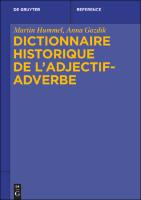Dictionnaire historique de l’adjectif-adverbe, Volume 1
Author(s)
Hummel, Martin
Gazdik, Anna
Collection
Austrian Science Fund (FWF)Language
FrenchAbstract
The Historical Dictionary of French Adjective-Adverbs (Dictionnaire historique de l’adjectif-adverbe) documents groups such as couper court, which combine a verb and an adjective with adverbial function. The 2.600 The expressions are classified by alphabetical order, from abaisser bas to voyager propre. The articles contain some 12.000 citations covering the whole history of French. Beschreibung (Beschreibung in einer anderen Sprache) The Dictionnaire historique de l’adjectif-adverbe (Historical Dictionary of French Adjective-Adverbs) is situated in a research context dealing with several Romance languages. Indeed, all these languages share the Indo-European tradition of using adjectives as adverbs, without any suffix, and especially in spoken language. The Indo-European includes English, where adjective-adverbs are generally known as short adverbs, e.g. speak clear. However, no systematic linguistic study has yet been dedicated to the historical development of these expressions. This is the object of this dictionary. For this purpose, an open access data base has been created which contains about 15.000 citations. Hence, the scientific community can freely use it for research (https://gams.uni-graz.at/context:aaif)
The dictionary provides a systematic empirical basis for research on the diachrony of short adverbs in French. The fact that short adverbs are well established in usage justifies the conception of a dictionary. However, they are also widely used for creating new expressions. Consequently, the dictionary combines the documentation of established with that of productive usage.
Aside from these linguistic purposes, the dictionary offers pleasant readings. In fact, the French linguist Lucien Tesnière alluded to the combinations of short adverbs as “savory expressions”:
Manger froid, boire chaud, dormir couché, debout
Un garçon com moi s’accommode de tout
Visons haut, pensons vrai, marchons droit
J’achète frais, j’achète appétissant, j’achète sain parce que j’achète sous cellophane
Chiez dur ou chiez mou, mais chiez dans le trou
The dictionary thus provides entries for more than 2.600 expressions that combine a verb with an adjective-adverb. The expressions are classified by alphabetical order, that is, from abaisser bas to voter utile. The number of different adjective-adverbs comes close to 450. The 2.600 entries are documented and illustrated with approximatively 12.000 citations covering the whole period from medieval to present day French. The impressive richness of usage shows that the usual perception in grammars of adjective-adverbs constituting a short and almost closed list of units does not match reality. The dictionary also includes some 3.500 citations stemming from Internet sources in order to testify informal present day usage.
The dictionary is preceded by a substantial linguistic introduction providing the state of the art of research on adjective-adverbs. In fact, since its creation, the research group “Adjective-Adverb Interfaces in Romance”, which has realized this dictionary, has published more than sixty articles and books on this topic (https://adjective-adverb.uni-graz.at). The dictionary thus combines lexicographic documentation with linguistic research. Das Historische Wörterbuch des französischen Adjektivadverbs (Dictionnaire historique de l’adjectif-adverbe) dokumentiert Gruppen des Typs couper court, die ein Verb und ein Adjektiv mit adverbialer Funktion kombinieren. Die alphabetisch geordneten 2.600 Einträge des Wörterbuchs reichen von abaisser bas bis voyager propre. Sie werden mit rund 12.000 Zitaten belegt, die die gesamte Geschichte der französischen Sprache umfassen.
Keywords
French, Adjective, Adverb; ÖFOS 2012, Romance studies; Französisch, Adjektiv, Adverb; ÖFOS 2012, RomanistikDOI
https://doi.org/10.1515/9783110629675ISBN
978-3-11-062958-3, 9783110629675Publisher
De GruyterPublisher website
https://www.degruyter.com/Publication date and place
2021Imprint
De GruyterClassification
Historical and comparative linguistics


 Download
Download